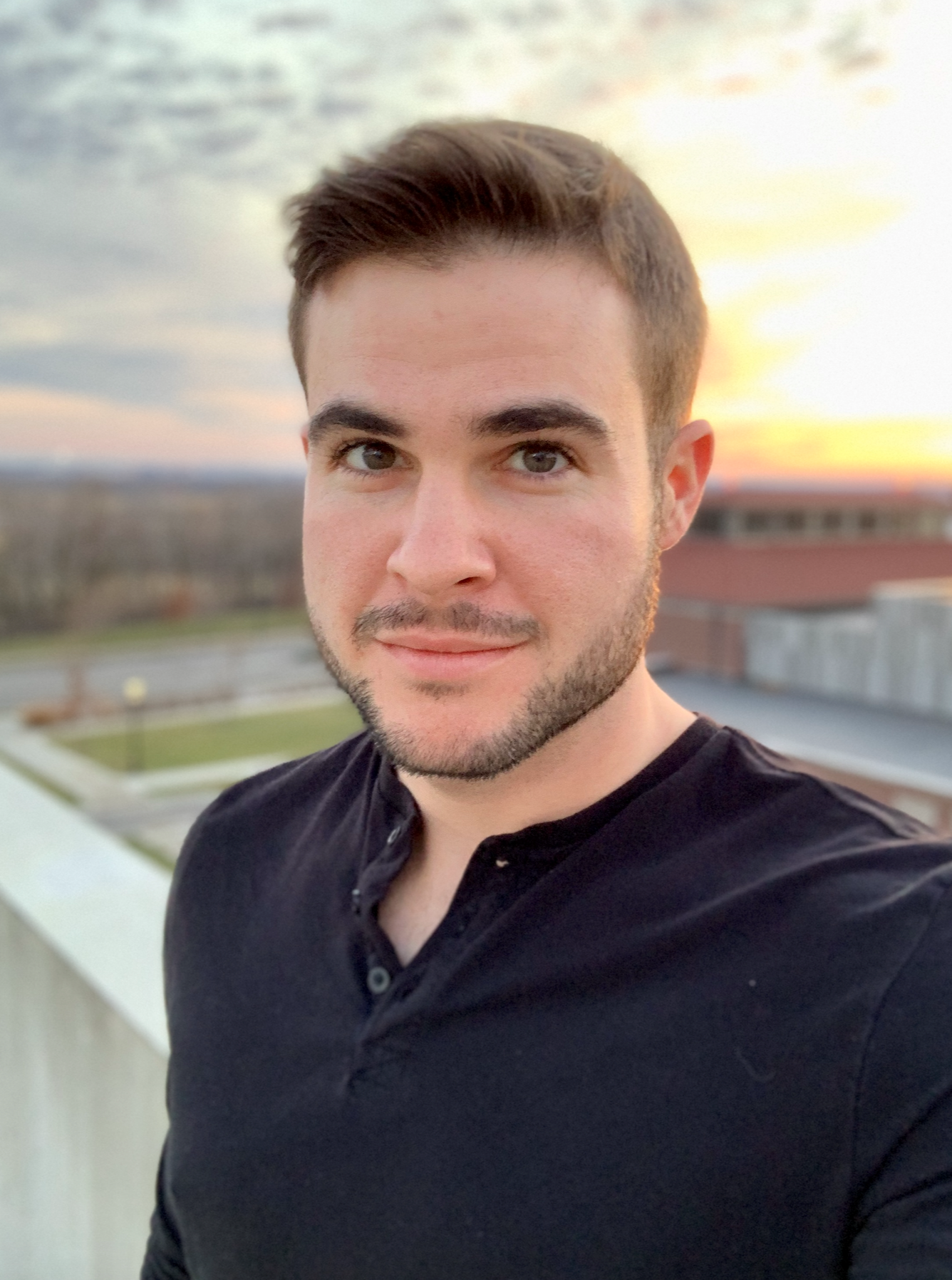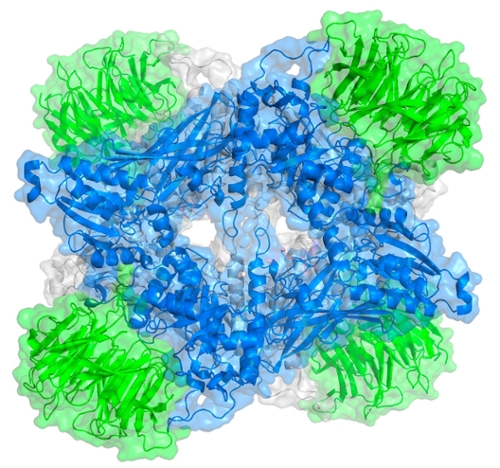
Andrew Asberry

Training Group:
Molecular Signaling and Cancer Biology
Mentor / Lab:
Chang-Deng Hu
Specific Research Area / Project:
Mechanisms and Targeting of PRMT5-mediated Neuroendocrine Differentiation in Prostate cancer
Lab / Personal work-related websites:
Personal LinkResearch Profile:
Small cell cancers are notoriously aggressive and remarkably difficult to treat. These diseases are also referred to as neuroendocrine cancers, and are found particularly in lung, pancreatic, and prostate cancers. Due to the high frequency of diagnosis in men in the US, prostate cancer is one of the most extensively characterized and provides a clinical data-rich context in which to study the development and progression of neuroendocrine tumor biology.
My research focuses on PRMT5, an enzyme involved in epigenetic regulation of gene expression. PRMT5 is upregulated in multiple cancers and is a validated therapeutic target with pharmaceutical drugs under development and in clinical trials for some specific cancers. My lab has demonstrated that PRMT5 is necessary for the development and maintenance of neuroendocrine differentiation from normal or primary tumor cells into the more aggressive and drug-resistant neuroendocrine-like cells. My goal is to understand PRMT5 from structural, epigenetic, and biochemical aspects to develop new drugs that can provide specific treatment options for patients to treat terminal-stage prostate cancer and provide a novel mechanism of action against neuroendocrine, or small cell, tumors in other cancers as well.

About Me:
I came to Purdue from a non-traditional route. After finishing my undergrad at Indiana University in biology and chemistry, I worked as a analytical biochemist in industry. From there I developed an interest in large-scale proteomics projects and because accustomed to working in multi-disciplinary teams to tackle biological problems. I decided to pursue a Ph.D. at Purdue in order to gain the training to tackle complex challenges and combine my interest in industry/commercialization with science. Purdue has such a strong track record of entrepreneurship and biotechnology that it was an easy choice where to obtain my graduate training.
My experience at Purdue has been incredible. The rotation experience allowed me to identify my PI and work on my same thesis topic in different labs. I was able to take the biological context for my thesis and perform the structural biology portion of my research at the Cryo-EM facility under Dr. Wen Jiang, who is now a member of my thesis advisory committee. My committee is comprised of experts in synthetic organic chemistry, computational biology and structural biology in addition to my advisor’s experience in the disease/clinical aspect. Without an interdisciplinary program, I would not have had such an opportunity to be mentored by four PI’s each in different areas of science. Because of my experience in PULSe, I was awarded a T32 fellowship to enhance my research under the Purdue Institute for Drug Discovery.
I would like to utilize my graduate training to combine the strengths from both academic and industrial environments. My goal is to harness the unrestricted creativity of research potential from academia with the resource-rich environment of industry not only to develop biological solutions but also to bring them to market. PULSe allowed me to perform a semester “internship” with the Purdue Foundry’s Center for Entrepreneurship in which I worked with PI’s with drug candidates and performed market analyses with experts including a former business analyst from Eli Lilly and the CEO of ImmuneWorks. My personal goal is to continue along this path and direct university-developed research to its most realized potential in the market.
Awards:
- Purdue Drug Discovery Training Program Fellowship (NIH T32) 8/2019-7/2021
- Regulation and characterization of gene expression in plants
- US Patent: Kumar S, Barone P, Hemingway D, Etchison E, Asberry A, Pence H, et al. Plant promoter for transgene expression. US20190002910A1, 2019.
- US Patent: Kumar S, Barone P, Hemingway D, Etchison E, Asberry A, Pence H, et al. Plant promoter for transgene expression. US20180094271A1, 2018.
- US Patent: Kumar S, Barone P, Hemingway D, Etchison E, Asberry A, Pence H, et al. Plant promoter for transgene expression. US20180094273A1, 2018.
- US Patent: Kumar S, Hemingway D, Ausmus C, Worden AF, Asberry A. Root-preferred promoter from a Panicum virgatum metallothionein-like gene. 9,914,934, 2018.
- US Patent: Kumar S, Hemingway D, Ausmus C, Worden AF, Asberry A. Root-preferred promoter from a brachypodium distachyon metallothionein-like gene. 9,914,933, 2018.
- US Patent: Kumar S, Hemingway D, Ausmus C, Worden AF, Asberry A. Plant promoter for transgene expression. US20180087064A1, 2018.
- US Patent: Kumar S, Hemingway D, Ausmus C, Worden AF, Asberry A. Plant promoter for transgene expression. US20180087063A1, 2018.
- US Patent: Kumar S, Asberry A. Constructs for expressing transgenes using regulatory elements from setaria ubiquitin genes. 9,758,789, 2017.
- US Patent: Kumar S, Hemingway D, Ausmus C, Worden AF, Asberry A. Plant promoter for transgene expression. US20160304894A1, 2016.
- US Patent: Kumar S, Hemingway D, Ausmus C, Worden AF, Asberry A. Plant promoter for transgene expression. US20160304895A1, 2016.
- US Patent: Kumar S, Berringer JR, Chen W, Asberry AM. Synthetic bi-directional plant promoter. US20160130594A1, 2016.
- Genetic Engineering in Plants
- US Patent: Corbin DH, Chen W, Novak S, Lee RM, Kumar S, Asberry A, et al. Reconstruction of site specific nuclease binding sites. US20180163218A1, 2018.
Publications:
- Beketova E, Fang, S, Owens JL, Liu, S, Chen, X, Zhang, Q, Asberry A, Deng X, Malola, J, Huang, J, Li, C, Pili, R, Elzey, B, Ratliff, T, Wan, J, and Hu, CD. Protein arginine methyltransferase 5 promotes androgen receptor transcription in a pICln-dependent manner in castration-resistant prostate cancer. (Cancer Research, submitted)
- Owens JL, Beketova E, Tinsley SL, Asberry AM, Liu S, Deng X, Huang J, Li C, Wan J, Hu CD. PRMT5 cooperates with its cofactor pICln to function as a master epigenetic regulator of DSB repair. iScience 2020
- Kumar, S., AlAbed, D., Whitteck, J.T., Chen. W., Bennett, S., Asberry, A., Wang, X., DeSloover, D., Rangasamy, M., Wright, T., Gupta, M. A combinatorial bidirectional and bicistronic approach for coordinated multi-gene expression in corn. Plant Mol Biol (2015) 87: 341.
Presentations:
- NIH T32 Training Program Presentation: Regulation of Protein Arginine Methyltransferase 5 (PRMT5) Activity as a Therapeutic Strategy. Purdue University Institute for Drug Discovery Training Program Fellowship Panel. Fall 2019
- NIH T32 Training Program Presentation: The Androgen Receptor as a Therapeutic Target in Prostate Cancer. Purdue University Institute for Drug Discovery Training Program Fellowship Panel. Fall 2019.
- Journal Club Presentation: Pioneer Factor-Nucleosome Binding Events During Differentiation Are Motif Encoded. Purdue Center for Cancer Research Journal Club. Fall 2019.
- Journal Club Presentation: Widespread and Functional RNA Circularization in Localized Prostate Cancer. Purdue Center for Cancer Research Journal Club. Spring 2019.
- Journal Club Presentation: LSD1 activates a lethal prostate cancer gene network independently of its demethylase function. Purdue Center for Cancer Research Journal Club. Fall 2018.
- Best Poster Presenter Award: Method Development for Protein Extraction from Cotton Fiber Plant Tissue Supporting Proteomic Analysis. (Internal) Purdue University Interdisciplinary Life Sciences (PULSe) Student. 2018.
- Second Best Poster Presenter Award: Indiana ACS Local Section. Dow AgroSciences Science Ambassadors K-12 STEM Outreach in Indiana Communities. 2017 Indiana Chapter, American Chemical Society
Leadership:
- Purdue University Life Sciences (PULSe) Graduate Student Organization Seminar Speaker Chair 2019-2020
- Student Profiles
- Aktan Alpsoy
- Andrew Asberry
- Carlos A. Brito-Sierra
- Clairissa Corpstein
- Hao Chen
- Rachel Foguth
- Logan Ganzen
- Veronica Heintz
- Ethan Hillman
- Kathryn Jacobson
- Steven McKenzie
- Vinay Menon
- Jasmine Moore
- Alexandr Pak
- Raquel Peron
- Runrun Wu
- Sudhanshu Shekhar
- Janiel Ahkin Chin Tai
- Yu Tang
- Chelsea Theisen
- Samantha Tinsley
- Nicole Vike
- Ravi Yadav

